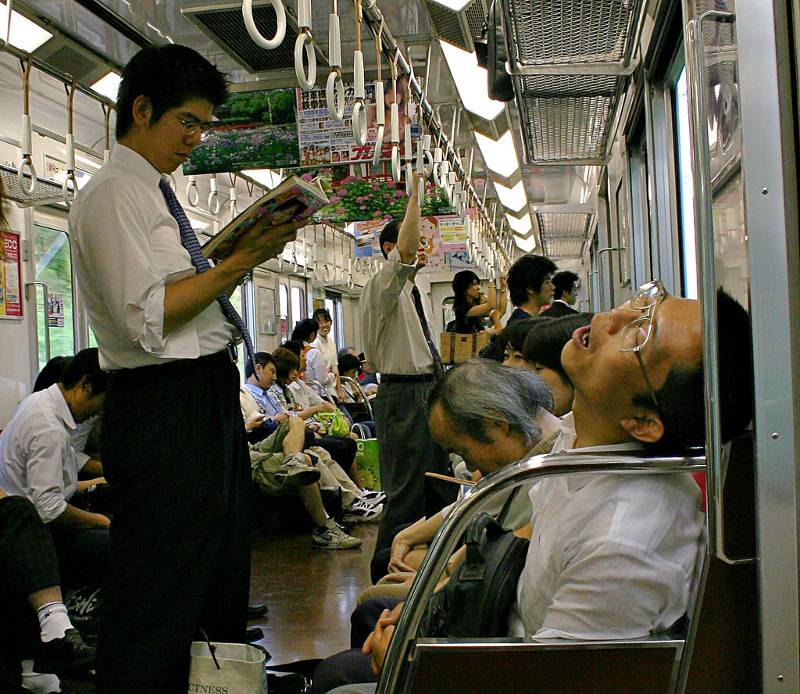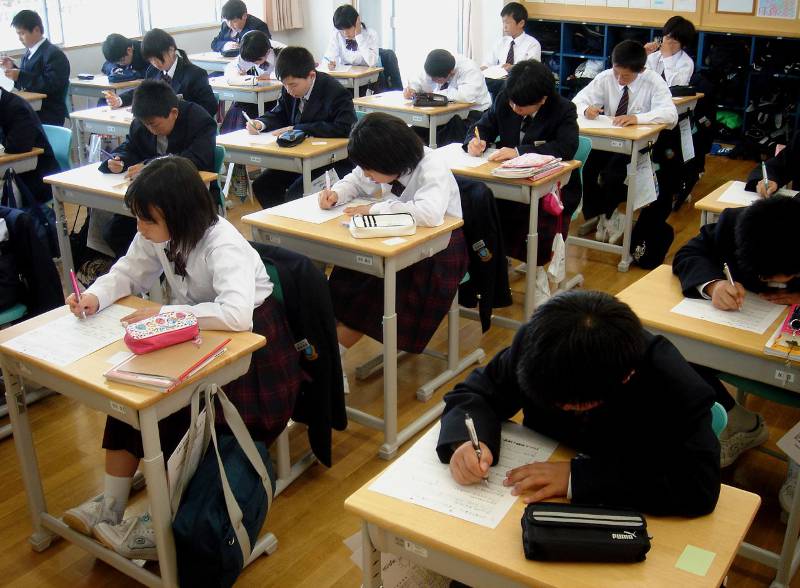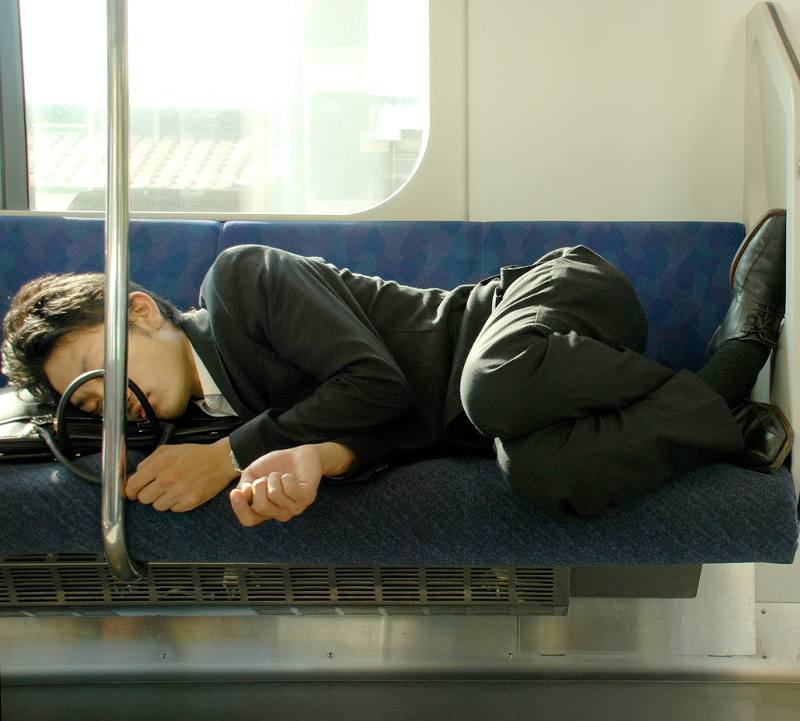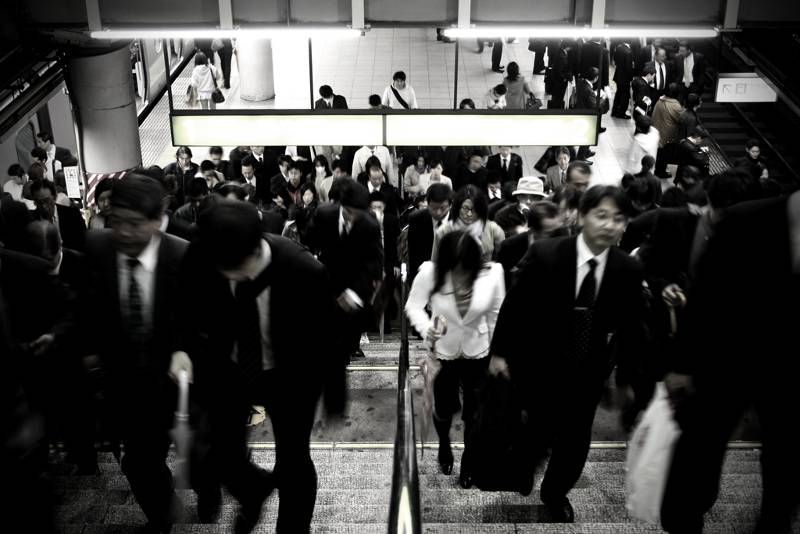"Hardworking Japanese people"
…How many of you have heard that phrase before? How many of you were tripped up by that phrase? And more importantly, for how many of you were the above three words as natural as, for example, "cultured French people"?
I too brought that stereotype to Japan. But like other stereotypes, well, there's true bits and false bits to it. You see all the salarymen half-asleep on the last trains departing from Shibuya and imagine what a hard day they must have had. But then you see the same thing in your university classroom and think – ehh, these people could at least drink some coffee before coming to class.
So this article is me trying to make sense of how hardworking the Japanese people are and putting my point of view out there. Perhaps this will be useful for those of you who are planning to work in Japan in the future too!
The Hardworking Side

If there's one thing the Japanese are known for, it's their long hours at the office. But what do the statistics tell us? Let's see what the OECD says for the year 2013:
Average Number of Hours Worked per Worker:
- Japan: 1735 hours per year
- South Korea: 2163 hours per year (result for 2012)
- UK: 1669 hours per year
- USA: 1788 hours per year
- France: 1489 hours per year
- OECD Average: 1770 hours per year
So it looks like the Japanese actually don't work so hard compared to other countries. They work less than the US and even less than the average. That makes them not so hardworking, right?
Not quite. This is an example of misleading statistics because for two reasons:
Higher incidence of part-time work in Japan
Multiple sources suggest that Japan's workforce has a higher proportion of part-time work compared to other countries. Some of this is because Japanese women tend to quit full-time work when they have a child only to return as part-time labor after a while. Some of this is due to workers only being offered part-time jobs despite wanting a full time job.
This part-time work depresses the average more than in other countries. Full time work in Japan, however, generally involves longer hours than those in other countries.
Inaccurate Reporting
Some of you may have come across the term saabisu zangyo. Basically, this refers to overtime which is kept off the official books with the full consent of the employee.
Officially, the working week in Japan is largely 40 working hours with additional limits for overtime work. But these limits don't have any effect if a worker doesn't clock those hours in – which is de facto what happens in many Japanese workplaces. This goes for both full-time and part-time work – an example being being paid as a waiter for a kaiten zushi restaurant but having to do the clean-up after the restaurant closes without pay.
The 1735 hours you see above is therefore a highly distorted number because of the under-reporting of working hours.
Education for Long Hours

Before people even get into the workplace, the Japanese education system seems to demand long hours of them as well. This is particularly with reference to the amounts of cramming students have to do in the lead up to their university exam (See the "Exam Hell" section here for some anecdotes). There are even reports of primary school entrance exams at some selective institutions.
However, do note that the fiercest competition is only reserved for those who want to enter schools on the higher end of the education system – The Japan Times reports that with the decrease in the Japanese youth population, the competition found during the 1980s has died down. It is not hard to get into a university in Japan right now (putting quality aside) if one wants to.
The Exceptions?

There are a few possible exceptions to the stereotype of long working hours. As I've written about before, the first thing that comes to mind is the university lives of the Japanese students. Since I wrote that, I've come across this additional article on Toyokeizai (in Japanese). The writer basically compares American and Japanese universities, and concludes that Japanese students do put fewer hours into studying at the university level than Americans do.
But otherwise I really had to rack my brain to think of exceptions – even the university example has to be qualified by how some people sacrifice their studies not for slacking off but to put time into something else, such as a sports clubs. Perhaps we can talk about the housewives? But they do labour at home. Or maybe parasite singles? But that's only a small slice of the Japanese population?
So the Japanese are hardworking then! Not so fast…
Hardworking ≠ Being Worked Hard

This is the main point which I think people misunderstand about Japan. When people characterize the Japanese people as hardworking, it usually implies that a Jiro-Dreams-of-Sushi-esque image of the conscientious, motivated, eager-to-serve Japanese worker willing to put his best into his job.
This image is overplayed and exaggerated on two points.
Motivation?
There is a difference in being motivated enough to work twelve hours a day at something and working twelve hours because your boss still hasn't left the office, or because of the general social pressure to not do so. Rocketnews has an article that looks at how much actual work is getting done in those long hours (the conclusion: not as much as you might think). And let's look at some statistics that relate to feelings of motivation:
- The Japanese report below average work satisfaction compared to other countries in the world. (Link in Japanese)
- Gallup reports very low percentages of engaged employees in Japan and very high numbers of "actively disengaged" (ie. I hate my job) employees.
- Similar conclusions by Aon Hewitt – Japan was the only country where the number of "passive" and "actively disengaged" employees were the majority.
- Quite high numbers of anxiety – largely coming from work especially in males.
Which in turn can be explained by the following:
- This article suggests that base pay is a very important factor for Japanese workers – stagnant pay over the past two decades wouldn't have helped motivation.
- After the collapse of the bubble economy, job security has decreased and as stated above, many can't even get full-time jobs in the first place. Job anxiety may make you work hard (or at least make you appear to do so), but that does not equate with being happy or motivated while doing so.
- Japanese HR practices as listed here that have the effect of decreasing engagement.
Productivity?
Another thing that we can question is, if the Japanese were so hardworking, surely they would be very productive as well! But this again isn't supported by the data. Here's what the OECD says about productivity in 2013 (ie. GDP per hour worked in USD terms deflated for purchasing power):
- Australia: $48.50/hr
- France: $50.90/hr
- Japan: $36.10/hr
- Korea: $29.90/hr
- Spain: $40.40/hr
- UK: $44.50/hr
- US: $56.90/hr
- OECD Total: $40.50/hr
This means that hour for hour, Japan produces less than the OECD average and at only around 3/5 of the average productivity of the US. Even when doing a per-industry analysis, this report notes that Japan is still behind in terms of productivity when compared to Europe and the US (though not for all industries). And note that these statistics are calculated based on output per hour, so given that hours are likely to be under-reported, actual productivity is likely to be even lower.
There are two ways of interpreting this low productivity: either the Japanese are only pretending to work, or they are actually putting in a lot of effort, but on the wrong things. Both are probably true – this link, and quite a few of the links I've included above refer to Japanese offices being full of people rushing around and acting busy, but not actually accomplishing much. There's also many comments about people sleeping in poorly conducted meetings and people just staying in the office because their boss is there, and so on, with nothing actually getting done.
On the other hand, there are also some examples in which Japanese people are putting in earnest hours but just in rather unproductive ways. Examples include the endless paperwork that the Japanese both produce and process diligently but which could be streamlined with better use of technology. This article also points out another thing – how many people do you really need to direct the traffic in Japan anyway? Sure they're all very hardworking in giving the traffic signals, but sometimes living in Tokyo you wonder if so many are really needed.
Quantity vs Quality

The conclusion seems to be yes, Japanese people put in many hours, but in the end much of this is due to peer pressure and job-security fears and not much actual work gets done. In fact, something I've heard while living here in Japan is that, since the people know that they're going to have to do overtime anyway, why bother to work hard and be efficient? You might as well lounge around and do things slowly since you'll pretty much be forced to have a 10-12 hour workday anyway.
I have to say the obligatory disclaimer that not all Japanese conform to this – and it's not just the individual but the sector and company too. Behind the great Japanese customer service lies the hard and earnest work of Japanese service staff. However, a different story applies to big Japanese conservative "dinosaur" corporations.
In short, the Japanese (at least those with full time employment) do tend to put in more hours than the average in many countries. However, don't expect them to be particularly content nor efficient while doing so. Working long doesn't necessarily mean working hard. And being worked hard can be different from being hardworking.
